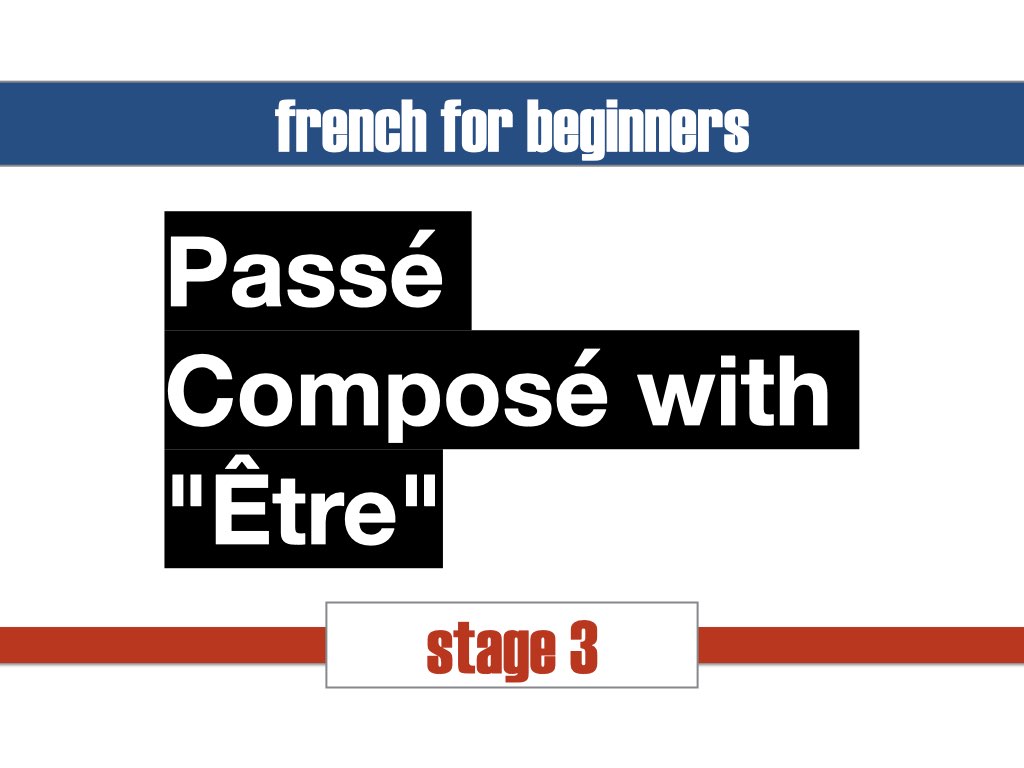Passé Composé with “Être” – French Grammar
Introduction
In this lesson, we will explore the passé composé tense in French, focusing specifically on verbs that use “être” as the auxiliary verb. This aspect of French grammar is crucial for discussing past events. Note that we will not cover reflexive (pronominal) verbs in this lesson.
Understanding Passé Composé with “Être”
Formation
The passé composé with “être” is formed using the auxiliary verb “être” in the present tense followed by the past participle of the action verb. The key difference when using “être” is that the past participle must agree in gender and number with the subject.
Agreement with the Subject
The past participle changes depending on the subject:
- Masculine Singular: No additional ending.
- Feminine Singular: Add -e.
- Masculine Plural: Add -s.
- Feminine Plural: Add -es.
Examples for Agreement:
- Il est monté. He climbed up.
- Elle est montée. She climbed up.
- Ils sont montés. They climbed up.
- Elles sont montées. They [feminine] climbed up.
Conjugation Table
| Affirmative (Positive) | Negative |
|---|---|
| Je suis allé(e) | Je ne suis pas allé(e) |
| Tu es arrivé(e) | Tu n’es pas arrivé(e) |
| Il est parti | Il n’est pas parti |
| Elle est restée | Elle n’est pas restée |
| Nous sommes venu(e)s | Nous ne sommes pas venus(e)s |
| Vous êtes sorti(es) | Vous n’êtes pas sorti(es) |
| Ils sont nés | Ils ne sont pas nés |
| Elles sont descendues | Elles ne sont pas descendues |
Dr. & Mrs. Vandertramp
A common mnemonic to remember the verbs that typically use “être” as the auxiliary verb in the passé composé is “Dr. & Mrs. Vandertramp”:
- Devenir (to become)
- Revenir (to come back)
- Monter (to go up, to climb)
- Rester (to stay)
- Sortir (to go out)
- Venir (to come)
- Aller (to go)
- Naître (to be born)
- Descendre (to go down)
- Entrer (to enter)
- Rentrer (to return)
- Tomber (to fall)
- Retourner (to return)
- Arriver (to arrive)
- Mourir (to die)
- Partir (to leave)
🍀 Exercises 🍀
Exercise 1: Conjugating in Passé Composé
Conjugate the following sentences in passé composé using “être”.
- (Je / partir) en France.
- (Tu / arriver) tard.
- (Il / tomber) dans les escaliers.
- (Nous / revenir) de vacances.
- (Elles / naître) en avril.
Exercise 2: Correct Form
Choose the correct past participle form to complete each sentence.
- Ils (ont / sont) ____ partis à huit heures.
- Elle (est / a) ____ restée chez elle.
- Nous (sommes / avons) ____ montés au premier étage.
- Tu (es / as) ____ retourné en Italie.
- Les chiens (sont / ont) ____ sortis dans le jardin.
Exercise 3: Translate into French
Translate the following sentences into French, using the passé composé with “être”.
- They (female) arrived at the party.
- I went back home.
- You (singular, informal) came from the market.
- He was born in Paris.
- We (mixed group) went out last night.
Conclusion
The passé composé with “être” is a key part of past tense narrative in French. By understanding and practicing the formation and agreement rules, you’ll enhance your ability to recount past events accurately. Remember, consistency in gender and number agreement is crucial for correct French communication.


